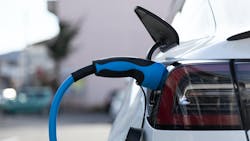FHWA Takes Step to Update Minimum Standards for EV Charging Infrastructure
The U.S. Department of Transportation’s Federal Highway Administration (FHWA) recently announced it will soon publish a Request for Information (RFI) to solicit feedback from stakeholders on updating FHWA’s minimum standards and requirements for electric vehicle (EV) charging stations.
FHWA set the minimum standards and requirements for federally-funded chargers to be flexible and responsive to rapidly advancing technology, creating space for innovation in a developing industry while setting standards to ensure a reliable consumer experience across the country.
With the implementation of J3400 TM, a new standard for charging EVs published by the Society of Automotive Engineers (SAE), any supplier or manufacturer will now be able to use and deploy the Tesla-developed North America Charging Standard (NACS) connector, which a majority of automakers have announced they will adopt on vehicles beginning in 2025 with adaptors available for current owners as soon as next spring.
The Joint Office of Energy and Transportation worked with SAE to develop a process and timeline for standardization that advanced at unprecedented speed. This RFI will help inform how FHWA can ensure new technology and innovation, like J3400TM, are incorporated into its minimum standards and requirements for federally-funded EV charging stations, and ensure that the available network of EV chargers will meet the needs of consumers now and into the future.
“EV charging technology is rapidly evolving and it is important that the Federal government keeps pace,” said FHWA Administrator Shailen Bhatt in a statement. “We’re working hand-in-hand with our federal, state, and local partners, and the private sector to ensure the national EV charging network meets the needs of all EV drivers, no matter what type of electric vehicle they drive.”
The Bipartisan Infrastructure Law’s $7.5 billion investment to build out a national EV charging network is intended to enable as many Americans as possible to utilize the public charging network. Current federal requirements allow for alternative types of connectors on all federally funded DC fast chargers so long as there is also a Combined Charging System (CCS) connector.
----------------------------------------------------------
Source: The U.S. Department of Transportation
